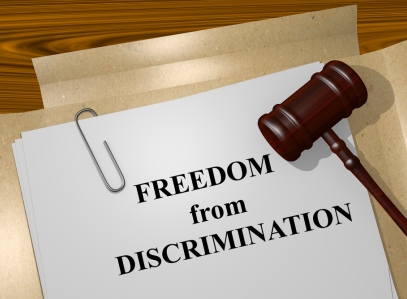Call Us At: 949-679-9909
Sexual Orientation Discrimination in the Workplace

California Law Prohibits Employers From Discriminating Against Employees Based On Sexual Orientation

It has been illegal for employers to discriminate against applicants and employees based on sexual orientation since 2000—the year the Fair Employment andHousing Act (FEHA) was amended to prohibit it.This amendment also provides victims of discrimination the basis for filing employment discrimination claims. Like other provisions of the FEHA, this section of the Act gives California residents much greater protection against discrimination in the workplace than under federal laws.
What Is Covered Under California’s Ban on Sexual Orientation Discrimination?
California law bans discrimination and harassment based on an applicant’s or employee’s sexual orientation and also prohibits employers from retaliating against an employee who complains about being discriminated against. Sexual orientation is defined as:
- Heterosexuality
- Homosexuality
- Bisexuality
It is unlawful for an employer to treat an employee differently because he is gay, straight, lesbian, or bisexual. The law protects against actual and perceived sexual orientation discrimination, which means an employer cannot discriminate against an employee even if he is wrong about the employee’s sexual orientation. The law governs many employment decisions such as:
- Hiring
- Firing
- Promotions
- Salary
- Benefits
- Bonuses
- Conditions of employment
- Demotions
Local ordinances may also protect against sexual orientation discrimination within their localities and may have commissions that will investigate complaints of discrimination. However, these local laws would not give an employee the right to sue under the FEHA.
Supervisors and co-workers can be the perpetrators of the discrimination. In addition, third parties like customers, salespeople, business associates, and clients can also be liable under the Act.
Unfortunately, discrimination against people due to their sexual orientation is still common, even with laws like FEHA. Common ways employers continue to discriminate against applicants and workers include:
- Denying a job opening to an applicant due to his sexual orientation or perceived orientation
- Denying an employee a promotion because she is bisexual
- Giving an employee a poor performance evaluation because the employer incorrectly believed he is gay
- Denying an employee training opportunities because she is a lesbian
- Firing an employee that an employer discovers is bisexual
- Retaliating against an employee by demoting him, denying him benefits, or otherwise punishing him for making a sexual orientation complaint or helping another employee with his complaint
Employers Who Must Comply With the Act
Employers who employ five or more employees are covered under the FEHA. However, there is no minimum employee requirement if the claim is for harassment. In addition, the law applies to the following:
- Employment agencies
- Labor unions
- State licensing boards
- State and local governments
The law does not apply to federal employees. Local laws may have different employer-size rules.
How Does Sexual Orientation Discrimination Differ from Gender Identity Discrimination?
The FEHA also prohibits discrimination in employment based on gender identity. Sexual orientation refers to whether a person is gay, straight, lesbian, or bisexual. Gender orientation is how a person perceives and identifies himself as male, female, both, or neither—regardless of his anatomical sex at birth. Discrimination based on either is illegal under California law.
What Should You Do if You Believe You Are the Victim of Sexual Orientation Discrimination?
If you suspect that you are being discriminated against due to your sexual orientation, you should not let your feelings immobilize you. You have rights under the FEHA to be free of discrimination, and you should take action to protect these important legal rights. Take these steps as soon as possible:
- Notify your supervisor, manager, or human resources department about the incident to try to resolve it. Follow up with a written notification of the discrimination, and keep a copy for your records.
- Document the discrimination by keeping a journal and saving all important correspondence and documents relating to the discrimination.
- Follow your employer’s grievance process if there is one, and talk to your union representative if you belong to one.
- Do not sign any documents without having an attorney review them first.
- File an administrative complaint with the Department of Fair Housing and Employment (DFHE). In order to file a lawsuit, you must first file a complaint with DFHE within one year of the last act of discrimination or harassment.
- Contact an experienced employment discrimination attorney as soon as possible to help you navigate the complexities of the law.
Discuss Your Situation with a Discrimination Attorney to Learn About Your Options
Are you the victim of sexual orientation discrimination? You could be entitled to compensation from your employer. Start an online chat right now or speak with a discrimination attorney in Irvine to learn about your legal rights.
| Related Links: |
No Legal fees unless you recover
The law offices of Corbett H. Williams takes most employee cases on a contingency fee basis
meaning that if we take your case, you pay nothing unless we recover for you.
Contact Us Today For a Free Case Evaluation Reliable & Trusted
If you are the victim of unlawful employment practices, including wrongful termination, sexual harassment, discrimination, or have not been paid all wages and benefits you are entitled to, the Law Offices of Corbett H. Williams can help. Call us today at 949-528-4220, or take a moment to fill out an online contact form for a prompt response. Delay could result in the loss of your claim, so don’t wait.
Request Your
Free Consultation
Fields Marked With An “ * ” Are Required

The Law Offices of Corbett H. Williams is always prepared to get clients started down the road to a more secure future. Take the first step and contact the firm today. The attorney will take care to answer questions and help decide what the most effective next step can be.

